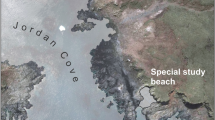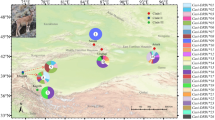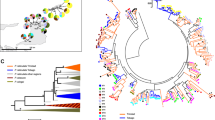Abstract
The I region of the major histocompatibility complex (MHC) of the mouse (H–2) contains a tightly-linked cluster of highly poly-morphic genes (class II MHC genes) which control immune responsiveness. Speculation on the origin of this polymorphism, which is believed to be essential for the function of the class II proteins in immune responses to disease, has given rise to two hypotheses. The first is that hypermutational mechanisms (gene conversion or segmental exchange) promote the rapid generation of diversity in MHC genes. The alternative is that polymorphism has arisen from the steady accumulation of mutations over long evolutionary peri-ods, and multiple specific alleles have survived speciation (trans-species evolution). We have looked for evidence of 'segmental exchange' and/or 'trans-species evolution' in the class II genes of the genus Mus by molecular genetic analysis of I–Aβ alleles. The results indicate that >90% (28 out of 31) of the alleles examined can be organized into two evolutionary groups both on the basis of restriction site polymorphisms and by the presence or absence of a short interspersed nucleotide element (SINE). Using this SINE sequence as an evolutionary tag, we demonstrate that I–Aβ alleles in these two evolutionary groups diverged at least three million years ago and have survived the speciation events leading to several modern Mus species. Nucleotide sequence comparisons of eight Mus m. domesticus I–Aβ alleles representing all three evolutionary groups indicate that most of the divergence in exon sequences is due to the steady accumulation of mutations that are maintained independently in the different alleles. But segmental exchanges between alleles from different evolutionary groups have also played a role in the diversification of β1, exons.
This is a preview of subscription content, access via your institution
Access options
Subscribe to this journal
Receive 51 print issues and online access
$199.00 per year
only $3.90 per issue
Buy this article
- Purchase on Springer Link
- Instant access to full article PDF
Prices may be subject to local taxes which are calculated during checkout
Similar content being viewed by others
References
Klein, J. et al. Nature 291, 455–460 (1981).
Mengle-Gaw, L. & McDevitt, H. O. A. Rev. Immun. 3, 367–396 (1985).
Wedeira, G. & Flavell, R. A. EMBO J. 3, 1221–1225 (1984).
Klein, J. in Immunology 80 (eds Fougereau, M. & Dausset, J.) 239–253 (Academic, New York, 1980).
Arden, B. & Klein, J. Proc. natn. Acad. Sci. U.S.A. 79, 2342–2346 (1982).
Klein, J. & Figueroa, F. CRC Critical Rev. in Immunol. 6, 295–386 (1987).
Sage, R. D. in The Mouse in Biomedical Research (eds Foster, H. L., Small, J. D. & Fox, J. G.) 1, 40–90 (Academic, New York, 1981).
Ferris, S. D. et al. Genetics 105, 681–721 (1983).
Marshall, J. T. in Curr. Topics Microbiol. Immunol. Vol. 127 (eds Potter, M., Nadeau, J. H. & Cancro, M. P.) 12–19 (Springer, Berlin, 1986).
Wakeland, E. K. & Darby, B. R. J. Immun. 131, 3052–3058 (1983).
McConnell, T. J., Darby, B. & Wakeland, E. K. J. Immun. 136, 3076–3084 (1986).
Wakeland, E. K. et al. Immunogenetics 26, 115–119 (1987).
Nei, M. & Li, W. H. Proc. natn. Acad. Sci. U.S.A. 76, 5269–5273 (1979).
Falus, A. et al. Immunogenetics 25, 290–298 (1987).
Malissen, M., Hunkapillar, T. & Hood, L. Science 221, 750–753 (1983).
Larhammar, D. et al. Cell 34, 179–188 (1983).
Houck, C. M., Rinehart, F. P. & Schmid, C. W. J. molec. Biol. 132, 289–306 (1979).
Jagadeeswaran, P., Forget, B. G. & Weissman, S. M. Cell 26, 141–142 (1981).
Bonhomme, F. in Curr. Topics Microbiol. Immunol. Vol. 127 (eds Potter, M., Nadeau, J. H. & Cancro, M. P.) 19–34 (Springer, Berlin, 1986).
Estess, P. et al. Proc. natn. Acad. Sci. U.S.A. 83, 3594–3598 (1986).
Acha-Orbea, H. & McDevitt, H. O. Proc. natn. Acad. Sci. U.S.A. 84, 2435–2439 (1987).
Duncan, W. R., Wakeland, E. K. & Klein, J. Nature 281, 603–605 (1979).
Wakeland, E. K. & Klein J. in Current Trends in Histocompatibility (eds Reisfeld, R. A. & Ferrone, S.) 4, 289–305 (Plenum, New York, 1981).
Duncan, W. R. & Klein, J. Immunogenetics 10, 45–65 (1980).
Winter, W. R. et al Diabetes 36, Suppl. 1, 22A (Abstract) (1987).
Potts, W. K. et al. in Major histocompatibility genes and their role in immune function (ed. David, C. S.) (Plenum, New York, in the press).
Author information
Authors and Affiliations
Rights and permissions
About this article
Cite this article
McConnell, T., Talbot, W., McIndoe, R. et al. The origin of MHC class II gene polymorphism within the genus Mus. Nature 332, 651–654 (1988). https://doi.org/10.1038/332651a0
Received:
Accepted:
Issue Date:
DOI: https://doi.org/10.1038/332651a0
This article is cited by
-
Determining Mhc-DRB profiles in wild populations of three congeneric true lemur species by noninvasive methods
Immunogenetics (2019)
-
The research of W.E. Mayer (1953–2012): a spectrum of immune systems
Immunogenetics (2012)
-
Contrasting responses to selection in class I and class IIα major histocompatibility-linked markers in salmon
Heredity (2011)
-
Prevalence and evolutionary origins of autoimmune susceptibility alleles in natural mouse populations
Genes & Immunity (2008)
-
Recent origin of HLA-DRB1 alleles and implications for human evolution
Nature Genetics (1998)
Comments
By submitting a comment you agree to abide by our Terms and Community Guidelines. If you find something abusive or that does not comply with our terms or guidelines please flag it as inappropriate.



